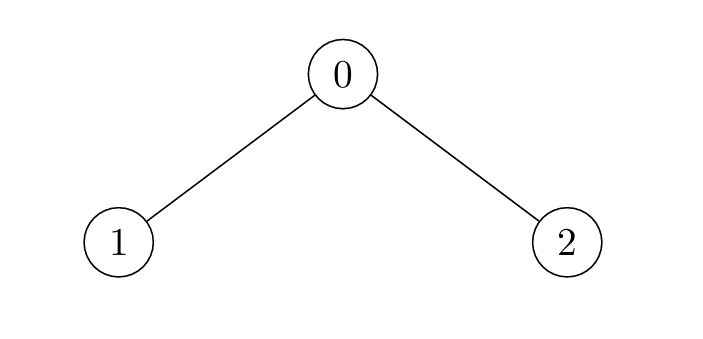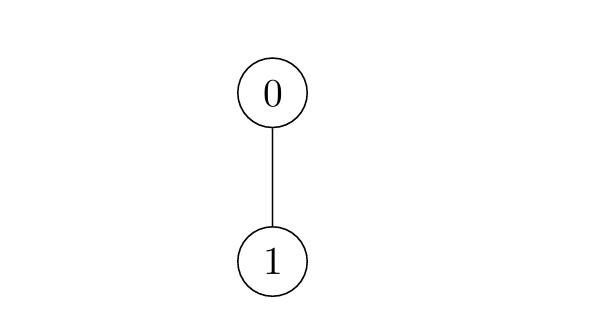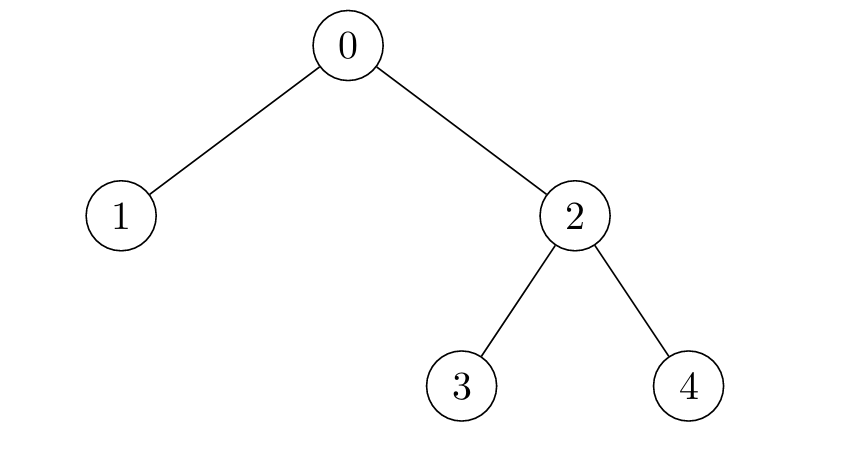LeetCode in Kotlin
3241. Time Taken to Mark All Nodes
Hard
There exists an undirected tree with n nodes numbered 0 to n - 1. You are given a 2D integer array edges of length n - 1, where edges[i] = [ui, vi] indicates that there is an edge between nodes ui and vi in the tree.
Initially, all nodes are unmarked. For each node i:
- If
iis odd, the node will get marked at timexif there is at least one node adjacent to it which was marked at timex - 1. - If
iis even, the node will get marked at timexif there is at least one node adjacent to it which was marked at timex - 2.
Return an array times where times[i] is the time when all nodes get marked in the tree, if you mark node i at time t = 0.
Note that the answer for each times[i] is independent, i.e. when you mark node i all other nodes are unmarked.
Example 1:
Input: edges = [[0,1],[0,2]]
Output: [2,4,3]
Explanation:

- For
i = 0:- Node 1 is marked at
t = 1, and Node 2 att = 2.
- Node 1 is marked at
- For
i = 1:- Node 0 is marked at
t = 2, and Node 2 att = 4.
- Node 0 is marked at
- For
i = 2:- Node 0 is marked at
t = 2, and Node 1 att = 3.
- Node 0 is marked at
Example 2:
Input: edges = [[0,1]]
Output: [1,2]
Explanation:

- For
i = 0:- Node 1 is marked at
t = 1.
- Node 1 is marked at
- For
i = 1:- Node 0 is marked at
t = 2.
- Node 0 is marked at
Example 3:
Input: edges = [[2,4],[0,1],[2,3],[0,2]]
Output: [4,6,3,5,5]
Explanation:

Constraints:
2 <= n <= 105edges.length == n - 1edges[i].length == 20 <= edges[i][0], edges[i][1] <= n - 1- The input is generated such that
edgesrepresents a valid tree.
Solution
import kotlin.math.max
class Solution {
private lateinit var head: IntArray
private lateinit var nxt: IntArray
private lateinit var to: IntArray
private lateinit var last: IntArray
private lateinit var lastNo: IntArray
private lateinit var second: IntArray
private lateinit var ans: IntArray
fun timeTaken(edges: Array<IntArray>): IntArray {
val n = edges.size + 1
head = IntArray(n)
nxt = IntArray(n shl 1)
to = IntArray(n shl 1)
head.fill(-1)
var i = 0
var j = 2
while (i < edges.size) {
val u = edges[i][0]
val v = edges[i][1]
nxt[j] = head[u]
head[u] = j
to[j] = v
j++
nxt[j] = head[v]
head[v] = j
to[j] = u
j++
i++
}
last = IntArray(n)
lastNo = IntArray(n)
second = IntArray(n)
ans = IntArray(n)
dfs(-1, 0)
System.arraycopy(last, 0, ans, 0, n)
dfs2(-1, 0, 0)
return ans
}
private fun dfs2(f: Int, u: Int, preLast: Int) {
var e = head[u]
var v: Int
while (e != -1) {
v = to[e]
if (f != v) {
val pl = if (v == lastNo[u]) {
(
max(
preLast,
second[u],
) + (if ((u and 1) == 0) 2 else 1)
)
} else {
(
max(
preLast,
last[u],
) + (if ((u and 1) == 0) 2 else 1)
)
}
ans[v] = max(ans[v], pl)
dfs2(u, v, pl)
}
e = nxt[e]
}
}
private fun dfs(f: Int, u: Int) {
var e = head[u]
var v: Int
while (e != -1) {
v = to[e]
if (f != v) {
dfs(u, v)
val t = last[v] + (if ((v and 1) == 0) 2 else 1)
if (last[u] < t) {
second[u] = last[u]
last[u] = t
lastNo[u] = v
} else if (second[u] < t) {
second[u] = t
}
}
e = nxt[e]
}
}
}

